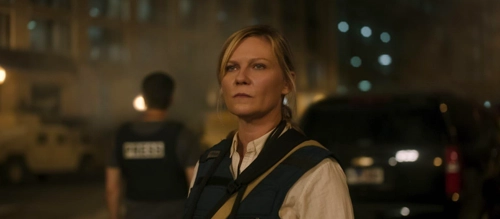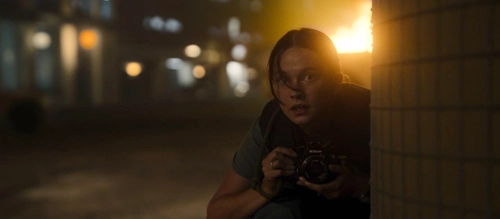Civil War (2024) Review

Civil War (2024)
Director: Alex Garland
Screenwriter: Alex Garland
Starring: Kirsten Dunst, Wagner Moura, Cailee Spaeny, Stephen McKinley Henderson, Sonoya Mizuno, Nick Offerman, Jesse Plemons, Nelson Lee, Evan Lai, Jefferson White
There aren’t many film scripts written as cutting satires four years earlier that could still be considered “hot button” by the time they are released. But that’s the current state the world, where it’s more than a little frightening how Alex Garland’s fourth directorial feature Civil War has only become more relevant over time.
In a very near future, after the President (Nick Offerman) declares himself a third-term autocrat, the states of California and Texas secede from the United States and bring about a costly second civil war. Meanwhile on the frontlines, a determined quartet of journalists (Kirsten Dunst, Wagner Moura, Cailee Spaeny and Stephen McKinley Henderson) begin a dangerous journey from New York to Washington D.C. in an effort to document the truth of what could be the end of the conflict.
Alex Garland has spoken in several interviews about his intentions behind the movie, about how he aimed to tackle reporting and extremism and how the truth can be warped by all sides in any number of ways before the message reaches its audience and either confirms or goes against their pre-conceived biases. You could have this debate in any number of talky, cerebral ways, but instead the Ex Machina and Annihilation director has presented this discussion in the form of an almost unbearably tense road movie.
Sometimes outsiders can bring the most clear-eyed view of what is happening to a country. The Mexican Alfonso Cuarón saw the the UK for what it could so easily become with Children of Men, and similarly the British Garland only needs to heighten the reality of contemporary USA politics slightly to give Civil War its power. America presents itself as a democracy to aspire to and, yet, the January 6 Capitol attack happened just over three years ago, its consequences still reverberating today.
The most extended period of time we spend with Offerman’s superlative-loving, Trumpian President is the film’s opening sequence where he is rehearsing a speech he is about to deliver to the divided nation, and our introduction to Dunst’s lead journalist shortly afterwards sees her taking his photo from a TV broadcast. He is always a presence, but kept at a distance for the majority of the film, others’ ideas of him and what he represents further fuelling the bloodshed.
It takes little effort to put together the workings of this near-future world, and that’s not a criticism. Our journalist protagonists are in the thick of it as they document the escalating conflict and attach themselves to a number of friendly (or at least not hostile) Western Forces military squads on their journey, but the enemy – the rest of the United States – is quite deliberately not given a face. There are references to an “Antifa massacre” and the President disbanding the FBI, but you’re largely left to put the pieces together of what exactly happened and how long ago. As a filmmaker. Garland has never liked serving everything up on a plate for the viewer, and that is the case once again in Civil War.

Each member of the core ensemble represents a different perspective on the role of a journalist. Kirsten Dunst is commanding as the pragmatic Lee Smith, doling out such wisdom of self-preservation to Spaeny’s idealistic rookie Jessie as “Once you start asking those questions, you can’t stop. So we don’t ask. We record so other people ask”. Travelling with Lee and Jessie are Moura’s headstrong, instinctive charmer Joel and Stephen McKinley Henderson’s Sammy, the latter of whom adds another seen-everything nurturing mentor role to a wide back catalogue. Of course you can always depend on Jesse Plemons to turn up for one scene and scare the crap out of you with the way he asks a seemingly simple question. In this case, it’s “What kind of American are you?”, and it makes for one of the most agonisingly tense scenes of the year.
The film is unglamorous and unromanticised almost to a fault. The action is used sparingly and this isn’t just due to DNA Films and A24’s budgetary concerns ($50million is an expensive project for either company but quite modest for a genre film of this scale). The battles we do see are more often than not viewed through the cameras of the journalists, running for cover and taking their shots just as the soldiers they are accompanying do, their harrowing still images punctuating the brutal skirmishes.
A needle drop is ordinarily used as a moment of catharsis for us as viewers, but here the tracks, from such artists as Suicide and De La Soul, often sound cheery until you listen to the lyrics that have been carefully selected to challenge the way war is filmed by the media and to make you feel uncomfortable.
Extremes of political ideology and their use as justification for atrocities is one of the main targets for criticism, but just as much, if not more so, is the morality of the media’s documentation of the horrors of war. Can you ever truly record the truth? And what does preserving evidence of harrowing death for all time as a key part of the story you are telling do to someone? Losing her innocence in a trial by fire, Jessie ends up as the most likely of the group to take the picture that matters, no matter the cost to her psyche and soul.
A stroke of near-genius is taking the imagery we’re all used to seeing in conflict zones around the world, from battles in city streets to hooded prisoners being marched to detention and mass graves being filled, and transplanting it to American landscapes and landmarks. There will always be people who deny what is happening if it inconveniences their daily lives, as shown in the central group’s brief stop in an idyllic small town preserved as it was in the before times (though still with an armed presence just out of view).
The film’s sound mix could admittedly be better – gunshots and explosions pack a guttural punch, but some dialogue is lost in the sonic chaos. After a steady build-up punctuated by extended sequences of sustained tension, many will also find the ending abrupt and even a little anticlimactic, though that may be the point – this is just a snapshot of a possible future.
Civil War is a taught and searing nightmare for the times; one that’s more about now than it is about things to come. It won’t be for everyone as it is neither as action-packed or verbose as some might expect such a pertinent political/war thriller to be, and Garland’s determined effort to avoid easy answers will frustrate as many people as it will please, but there are undeniably some indelible images here, and plenty of food for thought on how easily misinformation can spread and freedoms can be overturned.
Score: 20/24

